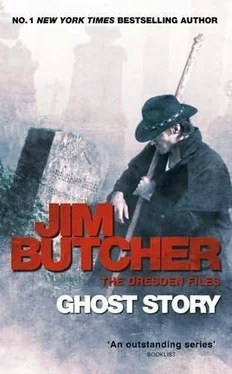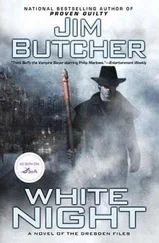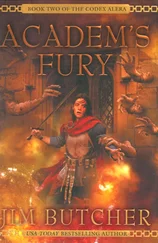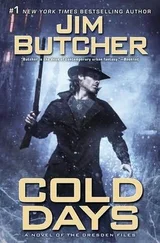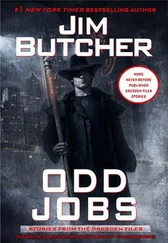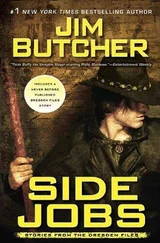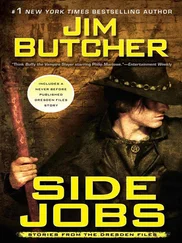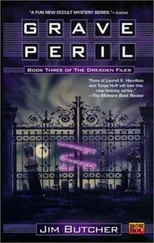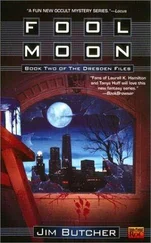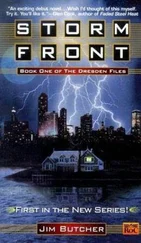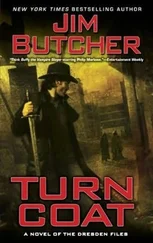“Assume you get the information and manage to survive the dawn,” the shade said. “Then what will you do?”
“I give it to Murphy, who uses it to rip the bad guys’ tongues out through their belly buttons.”
Sir Stuart blinked. “That . . . is certainly a vivid image.”
“It’s a gift,” I said modestly.
He shook his head and sighed. “I admire your spirit, man, but this is foolish.”
“Yeah. But I’ve gotta be me,” I said.
Sir Stuart put both hands behind his back and tapped a toe on the ground a few times. Then he gave me a resigned nod. “Good hunting,” he said. “If you have a problem with wraiths again, vanish. They won’t be able to keep up.”
“Thank you,” I said, and offered him my hand.
We traded grips, and he turned on a heel and started marching back toward Murphy’s place.
I watched him for a moment, then turned around and hurried after the snow-blurred forms of the gunmen, wondering exactly how much time I had left before the sunrise obliterated me.
The bad guys started hoofing it, and I followed them.
“Over here,” said one of them. He was youthfully scrawny, his skin bronze enough to look Native American, though his tangled red hair and pug nose argued otherwise. His eyes were an odd shade of brown, so light as to be nearly golden.
“What, Fitz?” one of the other gunmen said.
“Shut up,” Fitz said. “Give me your piece.”
The other handed over his gun, and Fitz promptly removed the magazine, ejected a round from the chamber, and pitched it into the snowbank, along with the weapon he was carrying.
“What the fuck?” said the disarmed gunman, and struck Fitz lightly in the chest.
Fitz slammed a fist into the other man’s face with speed and violence enough to impress even me—and I’ve seen some fast things in action. The other gunman went to his ass in the snow and sat there, hands lifted to cradle his freshly broken nose.
“No time for stupid,” Fitz said. “Everyone, give me your guns. Or do you want to explain to him why you tried to get us all thrown in jail?”
The others didn’t look happy about it, but they passed over the weapons. Fitz unloaded them and threw them all into the snowbank. Then, at his direction, they started patting snow into the hole the weapons had made, concealing them.
“Stupid, man,” said one of the young men. “One of those wolves gets on our trail, we got nothing to defend ourselves.”
“One of the wolves follows us back, we’ll have the Rag Lady on our asses, and guns will be useless,” Fitz snapped. “Pack it in tighter. Smooth it.” Then he turned to the man he’d struck and piled some of the fresher snow into the man’s hands. “Put that on your nose. Stop it from bleeding. You don’t want to leave any blood behind if you have a choice.”
The seated young man looked frightened, and did as Fitz told him.
“What are we doing?” asked another of the gunmen. He was smaller than the others, and his tone wasn’t challenging—it was a question.
“The truck’s stolen. They can’t trace it to us,” Fitz explained, dusting snow off his hands. “Even if the winter breaks tomorrow, it’ll be days before this melts and they find the weapons. With luck, they’ll never connect the two.”
“That’s long-term,” the little one said. “I sort of want to survive the night.”
Fitz almost smiled. “You want to walk down the streets of fucking Chicago with assault weapons in your hands? We could keep them out of sight in the truck. Not out here.”
The little guy nodded. “I can keep the knife, right?”
“Out of sight,” Fitz said, and lifted his head, listening and frowning. Sirens were a common sound in nighttime Chicago, but they had shifted from background noise to something louder, nearer. “Get moving, people.”
Fitz jammed his hands into the pockets of his rather light coat and started walking. The others hurried to keep up with him.
I walked next to Fitz, studying him. I was more impressed with the young man in the lousy attack’s aftermath than I had been during the drive-by. Any idiot can point a gun and squeeze a trigger. Not everyone can keep themselves calm and rational in the wake of an automobile collision, weigh the liabilities of the situation, and make—and enforce—their decisions in the face of opposition. Though the attack had been amateurish, it had not been stupid, and Fitz’s actions in response to the sudden hitch Sir Stuart had thrown into his plans were probably as ideal as the situation allowed.
Fitz was smart under pressure, he was a natural leader, and I had a bad feeling that he was the sort of person who never made the same mistake twice. He had just done his best to kill several people I cared a great deal for. Brains plus resolve equals dangerous. I’d have to see to it that he was neutralized at the first opportunity.
I followed them through cold I no longer felt and practiced vanishing. I’d jump ahead of them, behind them, onto ledges above them—all the while trying not to notice that the sky was getting lighter.
Something bothered me about the redheaded kid.
With the cops on the way, the store alarm ringing, his associates bleeding and dazed around him . . . why take a few extra, vital seconds to empty the guns? It had cost him about half a minute of time he certainly couldn’t afford to lose. Why do it?
I asked myself why I might do something similar. And the only answer I could come up with involved preventing whoever found the weapons from getting hurt. Fitz was willing to riddle a small Chicago house—and potentially the houses behind it, given the power of the weapons in question—with bullets, but he got all safety conscious when disposing of weapons? It was a contradiction.
Interesting.
Even more interesting was the fact that I’d cared enough to notice. Generally, if someone took a swing at my friends, I’d cheerfully designate him a target and proceed to make his world a noisy and dangerous place until he wasn’t a threat anymore. I didn’t lose a lot of sleep over it, either.
But I couldn’t just throw myself into the fight now, dammit. And, unlike before, those who threatened my friends could not also threaten me. I was safe from Fitz and his crew, unless they planned to keep walking until sunrise, and I was similarly no danger to them. Normally, I’d be fuming at the presence of people who had tried to kill my friends. But now. . .
We were absolutely no threat to one another. That made it sort of hard to keep my inner kettle of outrage bubbling along at maximum boil.
Fitz kept them all moving through the snowbound streets, stopping only once to check on the bleeder’s nose. Packing it in snow had stopped the blood loss, but the young man was disoriented from the wreck and the pain. There were other small injuries among his crew, and he stopped at a little convenience store, emerging with a bottle of water and an economy-sized bottle of painkillers. He passed them off to the short, inquisitive kid, and told him to double-dose everyone—and to keep moving.
It took them most of an hour of steady trudging through the cold to clear Bucktown and head for the South Side. A lot of people think of the South Side as a sort of economic desert crossed with a gang-warfare demilitarized zone. It isn’t like that—or at least, it isn’t like that everywhere. There are neighborhoods you don’t want to walk through wearing certain colors, or being a certain color, but they’re more exception than rule. The rest of the South Side varies pretty widely, with plenty of it zoned for industry, and Fitz and his group of battered pedestrians headed into an area on the fringe of an industrial park to a manufacturing facility that had been closed and abandoned for several years.
Читать дальше
